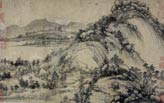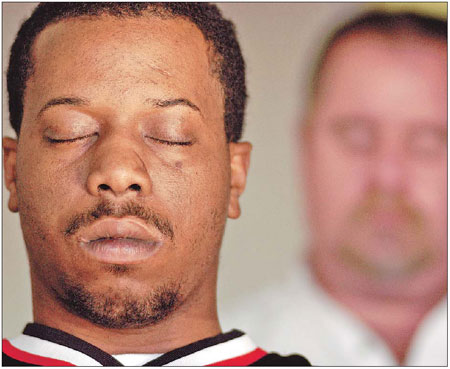Health
Mind over matter
Updated: 2011-06-15 08:14
By Usha Sankar (China Daily)
|
Taj Morris (left), of Philadelphia, Pennsylvania, in the United States, undergoes hypnosis to quit smoking. Simply put, the doctor hypnotizes smokers into believing that cigarettes taste like vomit. William Thomas Cain / Getty Images |

Hypnotherapist Dr Teoh Hooi-Meng says he taps into the power of the subconscious mind, which he claims guides 80 percent of our daily lives. Usha Sankar finds out more.
For almost a decade, a young company executive, who cannot swim, dreamed he was standing under a leaking ceiling from which water fell drop by drop, until it became a deluge that almost drowned him. Almost, because that would be the point when he would wake up, sweating. Just as inexplicably as the dreams began, they stopped. To date, he is clueless as to what triggered and sustained them for 10 long years, or what caused them to stop. But he does recall with great clarity exactly how it felt - it is rooted in his subconscious. The subconscious mind, says Dr Teoh Hooi-Meng, is a repository of our deepest memories and guides 80 percent of our everyday lives. A master hypnotist/hypnotherapist, who is registered with the American Board of Hypnotherapy and the General Hypnotherapy Register of the United Kingdom, Teoh says it is the formidable power of the subconscious mind that hypnotherapy harnesses.
"Have you ever been hypnotized?" Teoh asks as soon as I meet him.
Even as I shake my head in a vigorous no, he looks me straight in the eye and says, "But I say you are being hypnotized day in and day out".
I suddenly become acutely aware of his penetrating gaze as he continues, "Our subconscious mind is being bombarded with images and messages all the time. Take advertisements, for instance. It is nothing but a kind of hypnosis."
The conscious mind, aided by logic and reasoning, acts as a filter that processes all the information that comes in and determines our actions. But without us being aware of it, the subconscious mind is simultaneously filing away important inputs that lie buried but can become powerful agents of change.
A much sought-after personal development adviser, management consultant and trainer Teoh, 52, asks, "Have you ever noticed that after participating in a motivational workshop, all the positive messages that you are encouraged to give yourselves slowly seem to weaken in the days that follow?
"Perhaps, the first few days you may stand in front of a mirror and say with great gusto 'I can do it'. But slowly you become a little more aware that you cut a comical figure doing this. Your loud voice goes down gradually to a whisper, and soon you simply stand there not telling yourself anything."
But, Teoh says, were you to give your subconscious mind the 'can do' message 21 times - yes, this is the precise figure - you will find that that you have conquered a mental block. The message becomes embedded in the subconscious and you find yourself more confident.
"Hypnosis works on suggestion," Teoh emphasizes.
Today it is recognized as an effective tool to counter stress, anxiety, phobia, unwanted habits, addictions, disrupted sleep patterns, lack of confidence, low-self-esteem, fear of exams, public speaking, enhanced sporting performance, pain management and even anger management.
While the trance-like states associated with hypnosis go back thousands of years to ancient Egypt and India, the term "hypnosis" (Greek for sleep) was coined by Scottish-born physician James Braid in 1842. Although hypnosis as an altered stare of consciousness is attributed to German doctor Franz Mesmer (1735-1815), it was Braid who first postulated the physiological underpinnings of a hypnotic state. Austrian physician Josef Breuer's work in 1880 changed the methods of hypnotherapy by focusing on the cause of a client's distressing symptoms.
Sigmund Freud was attracted to Breuer's work, and co-authored the book Studies in Hysteria, which was published in 1895. But Freud later spurned hypnosis for his new approach of psychoanalysis. In more recent times, hypnosis saw a revival during the two big wars of the 20th century.
Teoh notes the patient is "fully conscious" in that he will immediately break out of the trance if he senses any bodily harm. Popular notions of a hypnotized person being "out of control" and made to do things contrary to his moral values is the stuff of Hollywood legend, he says.
One of Malaysia's most influential regression therapists, who specializes in past life regression, Teoh is also at pains to point out that hypnosis is a "do-with" and not a "do-to" process. "If you don't want to be hypnotized, then you won't be," he says. "Hypnosis' success depends on the client's belief system."
Once a quantity surveyor, working for a big Japanese company, Teoh's life took a dramatic turn quite by chance. Left without a job during the financial crisis of 1998, he found himself in an NLP (neuro-linguistic programming) workshop, where he got his first taste of hypnosis.
Asked about popular perceptions of hypnosis being nothing more than the hallucinations of an imaginative mind, Teoh is unfazed.
"Does it matter what name it is given as long as it produces positive results for people looking to alleviate distress that more formal treatments have failed to address?" he asks.
He readily admits that one of the main drawbacks of hypnosis as a therapeutic tool is that it is still not accepted by mainstream academia.
"Most hypnotists are self-taught," he says.
As I step into the elevator, after taking leave of Teoh, I stiffen as the doors close behind me. There in the corner is a little gecko.
"I won't be scared. I won't, I won't," I keep muttering. The lift reaches the ground floor, the doors open and I tumble out. I never make the magic figure of 21 repetitions. But I may have finally just discovered a cure to my No 1 phobia.
E-paper

Pearl on the Yangtze
Wuxi is considered a town of natural beauty and its motto is "city of water and warmth".
Prose and consternation
Riding on a mystery train
Way of a warrior
Specials

When two are one
After a separation of 360 years, Huang Gongwang's famous Dwelling in the Fuchun Mountains has been made whole again.

Wealth of difference
Rich coastal areas offer contrasting ways of dealing with country's development

Seal of approval
The dying tradition of seal engraving has now become a UNIVERSITY major

